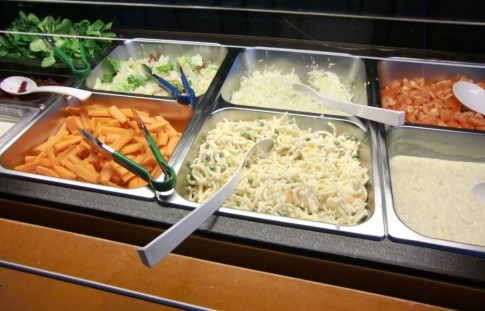Kids hate eating their greens? Try giving them a smile(y)
Pupils in school canteen experiment chose healthier lunch for positive reward
 Many parents will have struggled to persuade their children to eat healthily over Christmas; after all, households generally have a much more relaxed approach during the festive season towards treats like chocolate coins and candy canes.
Many parents will have struggled to persuade their children to eat healthily over Christmas; after all, households generally have a much more relaxed approach during the festive season towards treats like chocolate coins and candy canes.
But now, with the start of a new school term, school dinners can play an important role in re-establishing healthy eating habits following the traditional over-indulgence of the holidays.
But what’s the trick to getting kids to eat healthily – at school or at home?
According to latest European health research findings, a positive incentive – a ‘smiley’ face – could motivate children to make healthier food choices in the lunch queue at school.
“By developing a motivational game and recording the children’s lunchtime food, taking into account food that was taken but not eaten, we were able to accurately establish whether this motivation affected their choices and for how long the effect lasted,” says Associate Professor Wencke Gwozdz from Copenhagen Business School.
Prof. Gwozdz carried out the experiment on behalf of the EC-funded I.Family Study, a research project investigating the determinants of food choice, lifestyle and health in European families – particularly children and adolescents. I.Family is co-ordinated by the University of Bremen and the Leibniz Institute for Prevention Research and Epidemiology – BIPS, both based in Germany; the Copenhagen research team is led by Professor Dr Lucia Reisch.
Trials were completed in 10 schools in five countries across Europe, with the support of teaching and canteen staff, and involved pupils aged 5-12.
Prior to the experiment, children’s food choices were recorded for two weeks. Then each child was given a stamp card to use over the next two weeks. Children who swapped in at least one healthy portion on their lunch tray were rewarded with a smiley face. Finally, children’s food choices were then recorded for another two weeks, to see whether the smileys had a lasting effect.
The full findings of Prof. Gwozdz’s research will be published in a paper at a later date. But early results suggest that the children’s desire to collect more smileys encouraged them to go for the healthier options, over unhealthy ones, at lunchtime.
Prof. Gwozdz explains, “As some children took healthy food to get the reward but did not eat it, the amount of uneaten food did increase along with the amount of healthy options selected, but not as much food was wasted as was taken. Therefore, although the children took some food they did not eat, the overall amount of healthier food eaten certainly rose. The ‘smiley effect’ beyond the experiment varied by country – sometimes the effect was quite small a few weeks later, while elsewhere it remained fairly high.”
Prof. Gwozdz’s research identifies one factor that can improve healthy food choice in children and help schools to improve nutritional standards for their pupils. This could also have a positive impact for parents struggling to encourage healthy eating at home.
“Previous research has shown that repeating children’s exposure to vegetables and salad tends to increase their liking. So this game may make the consumption of these healthier foods a habit – not just at school but also in the home,” she says. “The game can be implemented in schools by collecting smileys over a week or two, perhaps several times a year, and a competitive element could be introduced by comparing classes. It is cheap and simple to carry out and could be combined with other efforts, for example a ‘healthy school week’ initiative or discussing nutrition in class.”
ENDS/Contacts and Notes follow
Notes for Editors:
- The I.Family Study is an EC funded project under Framework 7 of the KBBE programme running from March 2012 to February 2017. It has 17 partners, working across 11 countries and with cohorts in 8 European countries – Germany, Italy, Sweden, Hungary, Cyprus, Estonia, Spain and Belgium.
2. The study has two strategic objectives:
(1) Understand the interplay between barriers against and drivers towards healthy food choice;
(2) Develop and disseminate strategies to induce changes that promote healthy dietary behaviour in European consumers especially adolescents and their parents
3. The I.Family Study is re-assessing the families first engaged with the Identification and Prevention of Dietary- and Lifestyle-Induced Health Effects in Children and Infants Study (IDEFICS), when children were below 10 years of age, now that they move into adolescence – the ‘tween’ years – identifying those families that have adopted a healthy approach to food and eating habits and those that have not. I. Family is adopting a holistic approach by also investigating the biological, behavioural, social and environmental factors that drive dietary behaviour as children journey towards adulthood.
4. I.Family study partners
| Participant organisation | Lead investigator(s) | Key responsibilities |
| University of Bremen, Germany | Wolfgang Ahrens | Project coordinator |
| Leibniz Institute for Prevention Research and Epidemiology – BIPS, Germany | Iris Pigeot | German cohort, statistics |
| Institute of Food Sciences, National Research Council, Italy | Alfonso Siani | Italian cohort, nutritional epidemiology |
| Copenhagen Business School, Denmark | Lucia Reisch, Wencke Gwozdz |
Consumer behaviour & environmental influences |
| University of Lancaster, United Kingdom | Garrath Williams | Ethics, policy, and stakeholder engagement |
| Sahlgrenska Academy at the University of Gothenburg, Sweden | Staffan Mårild, Lauren Lissner |
Swedish cohort, family analysis |
| University of Helsinki, Finland | Jaakko Kaprio | Familial aggregation & genetic modelling |
| University of the Baleares Islands, Spain | Andreu Palou, Catalina Picó |
Genomic analysis |
| University of Pécs, Hungary | Dénes Molnár | Hungarian cohort |
| Rudolf Magnus Institute of Neuroscience, The Netherlands | Roger Adan | Neuroimaging & neuropsychology |
| Research and Education Institute of Child Health, Cyprus | Michael Tornaritis | Cypriot cohort |
| National Institute for Health Development, Estonia | Toomas Veidebaum | Estonian cohort |
| Fondazione IRCCS Istituto Nazionale Tumori, Italy | Vittorio Krogh | Dietary assessment methods |
| University of Bristol, United Kingdom | Angie Page, Ashley Cooper |
Physical activity monitoring |
| Minerva PRC Ltd, United Kingdom | Rhonda Smith Kate Viggers |
Dissemination and communication |
| University of Zaragoza, Spain | Luis Moreno | Spanish cohort |
| Ghent University, Belgium | Stefaan De Henauw | Belgian cohort |
Notes/End
151210-IF-PR18-FINAL







